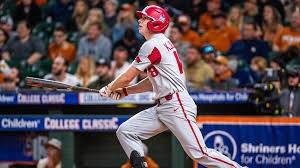You can find all our MLB Draft scouting reports here.
Photo: David Jensen/Icon Sportswire
Name: Vance Honeycutt
College: University of North Carolina
Bio: R/R 6-3, 205 lbs.
DOB: 05/17/2003
| Skill | Grade |
| Hit | 45 |
| Power | 60 |
| Run | 70 |
| Arm | 55 |
| Field | 70 |
| Future Value | 60 |
Written by Brandon Tew
Analysis:
Vance Honeycutt is the most exciting and most volatile player in the country. He’s one of the best athletes in the draft. He possesses the best physical tools with a combo of speed and strength that is hard to find. He’s built like an NFL safety and runs like a deer with long strides.
Honeycutt put his supreme athleticism on display for three seasons in Chapel Hill and impacted games in multiple ways. Ultimately, Honeycutt’s biggest flaw is his inconsistency as a hitter which will decide his future in pro ball.
College Career:
The career home run king for the Tar Heels mashed 65 dingers which he paired with 76 stolen bases, becoming the first Division I player in the career 60-70 club.
He strikes out too often (with a 26.5% career strikeout rate), but in 2024 he posted a slash line of .318/.410/.714.
In the table below, you can see the dichotomy of Honeycutt who in 2024 decided to revert to his pulling and lifting ways to increase production. However, this upped his strikeout rate and his aggressiveness led to his lowest walk rate in college.
| Year | HR | SB | WRC+ | OPS | K% | BB% |
| 2024 | 28 | 28 | 151 | 1.124 | 27.5% | 11.9% |
| 2023 | 12 | 19 | 121 | .910 | 20.4% | 19.6% |
| 2022 | 25 | 29 | 146 | 1.082 | 29.7% | 13.5% |
Honeycutt capped off his North Carolina career with an absolute heater of a run. He put on an aircraft carrier performance for the Tar Heels, accounting for 38% of their offense in the NCAA tournament. His launching 6 big flies during the postseason run is the definition of clutch.
VANCE HONEYCUTT WALKOFF pic.twitter.com/K9gjJ9qZcY
— Tar Heel Tapes (@TarHeelTapes) June 8, 2024
Batting Stance:
Honeycutt starts his stance with his feet and weight distributed in a comfortable position with his front foot a smidge outside of his left shoulder. As the pitcher breaks his hands, Honeycutt starts his leg lift, a simple medium-height lift that allows him to shift his weight into his back hip as he stacks his lower half.
At the peak of his leg kick, Honeycutt moves his hands back, turning his front shoulder closed and shifting his front foot to show the bottom of his cleat. Moving forward he creates a stretch in his swing and extends his front arm back with his barrel snapping into an almost 45-degree angle behind his head.
He brings his barrel through with quick hand speed that translates to the bat as he stops the momentum in his swing on his front leg decelerating his swing and momentum after contact
At times, there is extra movement in Honeycutt’s swing with his lower half and hands not being fully synced. When he is on time with a good hand path, he impacts baseball as well as any other prospect. He also can produce damage in different parts of the zone but loves to get his hands extended.
Approach:
Here’s Honeycutt explaining his approach at the plate:
.@DiamondHeels star Vance Honeycutt walks us through his swing at the #MCWS 💪 pic.twitter.com/D5l0CZolq7
— NCAA Baseball (@NCAABaseball) June 18, 2024
As a hitter, Honeycutt tries to get his “A Swing” off as much as he can, pulling and lifting the ball but can adjust and manipulate or delay his swing to stay on breaking pitches.
His walk-off against Virginia in the College World Series is a great at-bat as he stays on this slider after getting doubled up on the pitch. He is a little out in front but does well to get his bat to this ball and hook it into left field.
A walk off by North Carolina’s Vance Honeycutt in game one of the College World Series?!
What a start!
— Prospects Live (@ProspectsLive) June 14, 2024
Honeycutt is a definite guess-hitter which leads to some terrible-looking swings and non-competitive at-bats. His low swing percentage numbers both in and out of the zone suggest he’s looking for specific pitches early in at-bats.
His chase and whiff percentages especially on breaking balls further illustrate this point. Since Honeycutt is aggressive he will swing at spin hard. In certain at-bats, Honeycutt can look overmatched or in-between on his decisions, but he can deposit a ball over the fence at any point in a game if given a mistake pitch.
Honeycutt crushes these mistake pitches, on both badly located fastballs and hanging changeups or breaking balls. He also pulls the ball a lot. By keeping the ball off the ground, the loft in his swing takes full advantage of his plus power on bad pitches.
The biggest strides Honeycutt must make in his offensive profile is limiting swings and misses while still producing power. Improvement will come if his spin recognition improves and he stays in good-hitter counts in pro ball.
In 2023, Honeycutt was getting pitched around at points and was a much more patient hitter in the box taking a high amount of walks (19.6% rate) and cutting his strikeout percentage to 20.4%.
However; a team might decide that the best version of Honeycutt generates a threat from a power standpoint even if it comes with swing and miss. Honeycutt provides hard contact when he squares the ball up and drives the ball from foul pole to foul pole.
We track college baseball data across Division I, charting as many games as we can. That allows us to use what we call our “Synthetic Statcast” tool to calculate some statistics that you normally wouldn’t be able to get. Here’s where Honeycutt ranks in Hard-Hit Rate and Barrel Rate among players in major conferences
| Hard Hit % | Barrel % |
| 49.4% (97th) | 12.8% (93rd) |
Defense:
Honeycutt is the best defender in college baseball. He won the Rawlings Gold Glove for Division I outfield last year and led the college center fielders we tracked with 7 Runs Saved in 2024. He’s a converted infielder who spent a couple of days on the dirt in Chapel Hill before moving to the outfield and then began patrolling centerfield a short time after that.
There’s a natural ease at which Honeycutt moves and tracks the baseball. Not many base hits fall when Honeycutt is roaming in center and his ball-tracking skills have improved with time. His superb jumps and closing speed allow him to catch balls that other center fielders don’t come close to.
Here’s a video of some of the outstanding plays Honeycutt made in his freshman and sophomore seasons.
Vance Honeycutt goes up for a spectacular catch for @DiamondHeels!pic.twitter.com/9XiRvfSHhy
— MLB Pipeline (@MLBPipeline) March 19, 2023
Add to it, this remarkable diving catch where he comes zooming into the right-center gap.
Hello #SCTop10. Don’t forget about @HoneycuttVance. This is what elite defense looks like!! 👀 pic.twitter.com/tKlk5M5UqR
— Carolina Baseball (@DiamondHeels) April 5, 2024
And one more of him going back on this missile by Seaver King.
You’re gonna have to hit it farther to get it past Vance!🤯 @d1baseball #SCTop10 pic.twitter.com/ppc1zTX9UL
— Carolina Baseball (@DiamondHeels) May 25, 2024
Using our “Defensive Misplays” stat that we track for every game we chart throughout the season, we can take a closer look at what types of misplays each fielder is making. We define defensive misplays as “any play on which the fielder surrenders a base advance or the opportunity to make an out when a better play would have gotten the out or prevented the advancement.”
We also track “Good Fielding Plays” where a fielder prevents an advance or records an unexpected out. He’s an excellent fielder and sometimes will dive or try to make plays that no one else can, and these numbers reflect that. Here’s a breakdown of Honeycutt’s last two seasons.
| GFP Fly ball | GFP Hr Robbery | GFP OF Assist | DM on Throw or Allowing Advance | DM For Dropped Fly Ball or Bad Route |
| 10 | 2 | 3 | 9 | 3 |
Honeycutt had a combined 15 Good Fielding Plays and 12 Defensive Misplays of those types. By comparison, Enrique Bradfield Jr., an Orioles first-round pick last year had 11 Good Plays and 7 Misplays in the games we tracked for him last season. So Honeycutt may be a little more high-risk, high-reward than Bradfield, who currently leads minor league center fielders in Defensive Runs Saved.
Honeycutt uses his excellent timing, jumps, route efficiency, athleticism, as well as, a plus arm to make what feels like every play. With Gold Glove defense in center field that should take him to the big leagues at some point even if he doesn’t consistently hit.
Projection:
As an uber-athletic center fielder, Vance Honeycutt has star potential and on any given day can be the best player on the field. Impacting the game with his power, speed, and defense. When it comes down to it when he’s locked in his hit tool is a 50 and other days he might look bad with it showing more 40 and below.
His tools and raw talent are something to behold and his propensity to come up big in the big moments makes me think he can be a good enough hitter to thrive at the next level.
MLB Comp: Trea Turner production and speed. (Brenton Doyle with more power)


